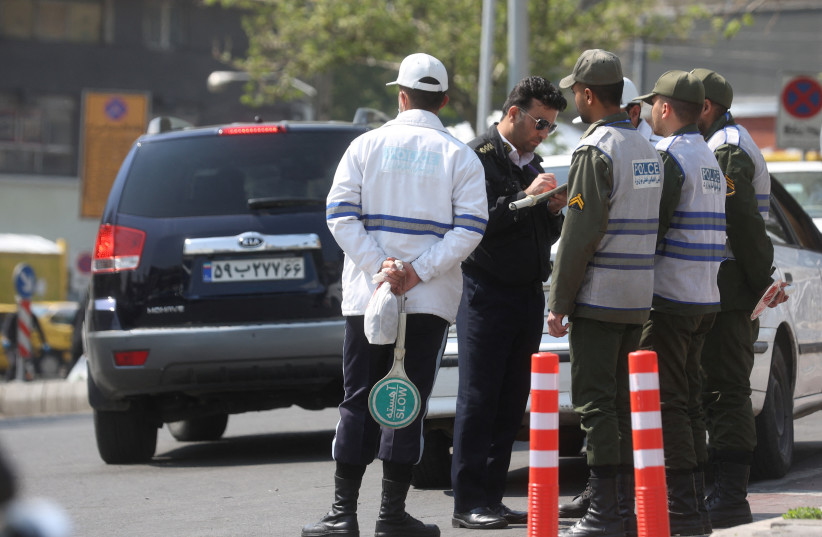Plainclothes hijab enforcers have been searching the personal bags and the phones of citizens at Tehran's Theatr-E Shahr metro station, the Iranian Jamaran news site reported on Tuesday.
The enforcers filmed citizens in the station, looked through their phones, photographing their mobile registry codes, and searched their bags.
A Jamaran correspondent asked one of the enforcers at the station why they were conducting such searches and was told that they were acting in accordance with an order from the Interior Ministry and with the assistance of the Tehran Municipality.
The report stated that this "shows that the citizenship rights and even in some cases the fundamental rights stipulated in the law for Tehranis are being violated under various pretexts."
The report additionally questioned if "police officers can violate the law in order to implement orders from higher authorities" and if it's legal for plainclothe or even uniformed police officers to search the personal belongings of citizens without a warrant.

Plainclothes agents enforcing hijab rules on metro
In recent months, plainclothes agents known as "hijabban" have been seen in metro stations in Tehran, enforcing hijab laws.
According to Radio Farda, Iran's Interior Minister Ahmad Vahidi claimed earlier this year that the hijabban weren't connected to the government.
The mayor of Tehran also claimed that the enforcers were "spontaneous" gatherings of people.
Despite the claims, the reformist Etemad newspaper published a circular from the Interior Ministry about the hijabban that mentions "arresting" and "dealing with" women without hijab, including by "photographing and documenting" when they are not wearing hijab in various places, including in "all parts of the subway," according to Radio Farda.
Additionally, Abdol Hossein Khosrow Panah, the secretary of the Supreme Council of Iran's Cultural Revolution, said recently that the enforcers were coordinated by the Interior Ministry.
Iranian authorities continue hijab crackdown
Despite temporarily relaxing enforcement of hijab laws after protests swept Iran last year following the killing of Mahsa Amini, Iranian officials have since renewed their crackdown on women not wearing hijab, introducing new measures including the use of surveillance cameras to enforce hijab laws.
Amini, a Kurdish Iranian woman, was arrested by "morality police" officers in Tehran in mid-September last year for allegedly incorrectly wearing her hijab, with her family saying that she was beaten by the officers in the van that brought her to the police station.
At the police station, she collapsed and was brought to the hospital where she later died. Her relatives have told foreign media that they were kept largely in the dark about the situation.
Amini’s death sparked intense nationwide demonstrations last September, commonly referred to as the “Woman, Life, Liberty” (“Jin, Jiyan, Azadî” in Kurdish) protests, which continued in full strength for months on end.
Despite the continued crackdown, Iranian women have increasingly been seen in public without the hijab.
Earlier this month, Dr. Fatemeh Rajaei-Rad, a professor and surgeon, was fired from the Babol University of Medical Sciences a little over a month after she attended an award ceremony for doctors without wearing a hijab.
During the ceremony in late October, Rajaei-Rad was honored as an exemplary doctor in the city of Amol, northeast of Tehran, and was seen in a video from the event receiving the award with her hair uncovered and a scarf wrapped around her neck.
After the incident, a video was published showing the surgeon apologizing for not wearing the hijab and for "insulting the sanctities" of religious citizens. In the video, Rajaei-Rad also said that she doesn't intend to seek asylum elsewhere, saying "My roots are in this land and water and I have no intention of leaving my country. I chose Iran to live, serve and die, and that's why I have to obey all laws, including observing hijab."
Shortly after the video was published, a close relative of Rajaei-Rad told the Independent Persian that the surgeon had been detained, beaten and threatened by agents of the intelligence department in Amol, and forced by the agents to read a pre-written text for the video.
